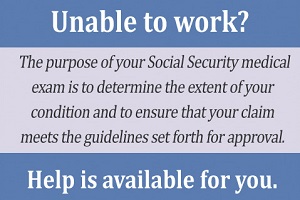
LAW FIRM BLOG
Consultative Exams Explained
August 25, 2019
A Consultative Exam (CE) is a medical examination (physical and/or psychological) with a licensed physician selected by the Social Security Administration (SSA). They are not for the purpose of receiving medical treatment. And the examining doctor will not even state an opinion as to whether you should receive disability benefits. The CE doctor is contracted only to give a one-time evaluation of the Claimant (the disability applicant) and document and report the findings.
Contrary to popular thought, CE doctors are not Social Security employees. Rather, they are independent contractors, typically in private practice, who are giving an expert opinion about your conditions and reporting on what you may tell them.
Who Pays for a Consultative Examination?
The Social Security Administration pays for all CEs, even if your own physician performs it. The SSA will even pay your travel expenses, if substantial travel is required for you to attend your examination.
What Does It Mean if a CE Has Been Scheduled?
That appointment letter from the SSA asking you to appear for a CE means that your claim is actively being worked on, but that the medical records obtained do not provide sufficient evidence for the SSA to make an informed determination about the existence and/or the severity of a disability in order to approve or deny an application for benefits. The Disability Determination Service (DDS), the agency that helps the SSA make disability determinations, will request that you undergo a consultative examination or take additional tests if, for example, the evidence is not recent. Social Security defines “recent” as within the past 90 days. CEs are also requested if a claimant has been only sporadically treated by a doctor, or the claimant has listed a condition on the disability application for which they have never been treated, or been diagnosed or your doctors have not responded to Social Security’s requests for medical records.
The goal of this exam is for a third-party doctor (not known to you) to render an objective opinion with respect to your medical condition. It is common for a CE to be scheduled and it does not mean anything negative or positive in your case. These exams most often happen a few months after you first apply for disability.
Mere Formality?
Officially, the purpose of any CE is so that a disability examiner or judge may obtain additional medical record documentation. Some critics believe disability consultative exams are scheduled, not to determine the state of the claimant’s health or even functional limitations, but as a required formality that must be satisfied before the examiner can close the case, as disability examiners cannot close cases without "recent medical evidence." Critics argue that it is unlikely that the findings of a CE will alter the examiner’s disability decision. Indeed, they believe that in most cases the examiner has already formed a mindset well in advance of the CE. Moreover, CEs are unlikely to trump the opinion of your treating physician or the evidence contained within your medical records.
What Happens at a Consultative Examination?
If you’re physically impaired, the physician may conduct a comprehensive examination that includes obtaining your complete medical history plus additional laboratory and physical testing. If your impairment is one of a mental nature, a psychiatrist or psychologist will conduct a series of psychological tests. Your consultative examination might not be a comprehensive one, however. If your existing medical records are just missing a certain piece of information about your health, you’ll only need to undergo that specific test or procedure that will give the SSA the missing information (for example, an x-ray, breathing test, blood test).
Am I Required to Attend a CE?
It's essential for you to go to the exam. Not going, or asking for repeated rescheduled appointments, can get your case denied for "failure to cooperate." Social Security will, however, reschedule you if you miss one or more appointments, and have a valid reason, such as an illness, or unexpected transportation issues. If you absolutely can’t attend contact the disability examiner in your case as soon as you are aware of a conflict to reschedule the appointment.
If you don’t appear, the SSA will use whatever information it has available on file to make its decision. If your file is incomplete, as it most likely is, they might deny your claim. In fact, failure to attend a CE or multiple CEs can alone be a basis for dismissal of your claim, regardless of your level of impairment. If you don't go to the consultative exam arranged for you, your disability claim will, of course, be decided without medical evidence from the CE. In all likelihood, then, the SSA will make a determination based only on the medical evidence currently in the file, and it will likely be a denial.
Problems With Consultative Exams?
Some perform this service for Social Security simply because the exams take very little of their time (10 to 15 minutes on average), and provide them with a steady source of income. A CE is a poor substitute for an established doctor-patient relationship. A doctor who conducts a consultative exam has typically never seen the claimant. Also, very often, the examining doctor was not sent any medical background information by the DDS examiner to give them insight into the claimant's condition or though DDS examiners send a claimant's medical records to the physician who will conduct the CE, they don't actually read the file ahead of time.
 Social Security only requires that the doctor be a licensed physician. Social Security medical exams are carried out by private physicians with their own practice, the thought being that such individuals will be unbiased in their opinions. And yet, this is not always the case, as many people who have attended CEs have reported that the physician was rude or dismissive. Unfortunately, some doctors who perform CEs have a bias against Social Security's disability programs, or disability claimants themselves.
Social Security only requires that the doctor be a licensed physician. Social Security medical exams are carried out by private physicians with their own practice, the thought being that such individuals will be unbiased in their opinions. And yet, this is not always the case, as many people who have attended CEs have reported that the physician was rude or dismissive. Unfortunately, some doctors who perform CEs have a bias against Social Security's disability programs, or disability claimants themselves.
In addition, the doctor performing the CE may not even specialize in a medical field that deals with their disabling condition (i.e. you may be alleging degenerative disc disease) but your consultative examination doctor might be a doctor whose specialty is completely removed from such conditions (an allergist). Basically, Social Security sends you to whoever is available in your area to conduct a general exam.
The Effect of a Social Security Medical Exam on your Case.
The CE, in most cases, will not carry as much weight as your past medical history and the observations made by your regular treating physician or medical specialist. Of course, it’s only logical that a CE can’t be given the same weight as your entire medical history; it can only show your physical capabilities at the time of the exam and offers no real insight into your medical condition. The brief nature of the exam and the fact that the examining doctor has never met nor treated you illustrates how unlikely it is for most CEs to alter a person's case.
A CE can, however, in some instances, provide a disability examiner with an up-to-date snapshot of the claimant's current medical condition that simply allows the examiner to go ahead with an approval--when the remaining older evidence in the file is strong and validates the case.
In addition, a "mental" CE, meaning a psychological or psychiatric evaluation, can be especially critical to those seeking benefits based on a mental impairment. Many individuals who are filing based on one or more mental conditions have often not received regular (if any) mental health care in the past, and the CE could be the only medical documentation or support available to the examiner working on their application.
The most important aspect to remember about a consultative exam is that it is a tool used to further the purposes of the social security disability agency (i.e., closing cases, denying claims) rather than those of the claimant (receiving benefits).
Can the CE be Performed by my Personal Doctor?
This is the stated preference of the SSA. In fact, the Social Security official list of impairments, or blue book, states that “The treating source (i.e. the claimant's doctor) is the preferred source for a CE if he or she is qualified, equipped, and willing to perform the examination for the authorized fee.”
However, your notice of a consultative examination will probably not tell you that you have the right to have your own physician perform the examination.
Check with your doctor to make sure that he or she is willing to conduct a Social Security Disability examination. Many physicians are reluctant to do so, because of the voluminous paperwork and the minimal reimbursement. If your doctor is willing, inform the disability analyst listed on your notice so that he or she will send your doctor the paperwork to complete. If you meet any resistance on the part of the disability analyst, quote the Social Security regulations which state that when at all possible your treating physician should perform this examination. It is also probably in the claimant’s best interest to have the CE done by his or her treating physician. Your own doctor is far more likely to understand your medical condition, as well as any limitations it imposes on your ability to perform daily living activities or work activities.
That said, it is rare that a claimant for Social Security disability or SSI disability goes to a CE that is conducted by his or her treating physician. This is because there are relatively few doctors who are interested in performing them for the SSA.
If you are scheduled for a CE and you want your own doctor to do it, again, first ask him or her if that is a possibility. And, then notify the disability examiner in your case that, per your request, this would be your preference. That may not be enough to guarantee that your own doctor will be performing the exam, however. Social Security rules give the disability examiner the option to use an independent medical source for the consultative examination or diagnostic test if:
1. Your doctor prefers not to perform the examination;
2. Your doctor does not have the equipment to provide the information needed for your disability determination;
3. You prefer to go to a different doctor and have a good reason for doing so;
4. Your doctor is not a "qualified" source for medical information. By "qualified," they mean currently licensed in the State and have the training and experience to perform the type of examination or test requested.
5. Your doctor does not have a good understanding of SSA's disability programs and their evidence requirements.
Usually, claimants simply go to exams that are conducted by contracted doctors whom they've never met. Generally, medical sources are selected based on appointment availability, distance from a claimant's home, and ability to perform specific examinations and tests.
What Does a Consultative Examination Entail?
The examiner will ask you about your medical history and your subjective complaints and will conduct a physical examination. In addition, the doctor will complete any specific tests requested by the DDS. The examination report from your CE will contain your medical history, the results of a physical examination, your treatment history, and any laboratory findings.
Consultative Examination Report Content.
The consulting doctor who performs your exam will send a written report about the results of the examination and the tests you took. The report should enable an independent reviewer to determine the nature, severity, and duration of the impairment, and, in adults, based on the doctor's own findings, the claimant's ability to perform basic work-related functions. The doctor will typically also include a diagnosis and prognosis of your condition and a statement about what you are capable of doing, such as how many hours you can stand or walk and how many pounds you can lift. The doctor may also include notations on his or her opinion of whether your symptoms are as serious as you say. Consulting doctors will be on the lookout for disability claimants who are faking the severity of their condition. The report should not include an opinion as to whether the claimant is disabled under the meaning of the law.
 How the DDS Reviews Consultative Examination Reports.
How the DDS Reviews Consultative Examination Reports.
The CE report must:
Provide evidence that serves as an adequate basis for disability decision-making in terms of the impairment it assesses.
It must be internally consistent. Are all the diseases, impairments, and complaints described in the history adequately assessed and reported in the clinical findings?
It need be consistent with the other information available within the specialty of the examination requested.
Did the report fail to mention an important or relevant complaint within that specialty that is noted in other evidence in the file (e.g., blindness in one eye, amputations, pain, alcoholism, depression)?
Conclusions in the report should be consistent with the objective clinical findings found on examination and the claimant's symptoms, laboratory studies, demonstrated response to treatment, and patient history and explain any inconsistencies.
What Is a Mental Status Examination?
If you're applying for Social Security disability based on a mental, psychological, or emotional condition, the SSA will often schedule you for an independent evaluation with a psychologist or other mental health professional.
In many DDS offices, mental consultative exams are scheduled for almost all claimants who allege mental health problems, regardless of their treatment history. Sometimes mental examinations are even ordered for applicants who don't actually allege mental health issues, but rather there is some indication in the file (for example, on a form completed by a third-party) that mental health problems may be present.
Mental consults are like physical consultative exams in that they are used by disability examiners to help establish the claimant’s current medical state.
The scope of a mental consultation is narrow. The mental consult is used to determine such things as memory function (the memory scale exam), impaired cognitive function (IQ tests, concentration tasks, etc.), and social skills (ability to function in a social or work environment).
There are several different types of mental examinations that SSA can order in a given case. For those with issues like depression, anxiety, bipolar disorder, schizophrenia, schizoaffective disorder, or psychosis, SSA will often schedule a "mental status exam" (MSE), which is meant to provide a snapshot of your current mental condition. At an MSE, the psychiatrist will test your intelligence, memory, concentration, judgment, and ability to follow directions. You may be asked to take an IQ test or other neuropsychological tests.
When Is a Psychological Evaluation Also Performed?
Psychological evaluations will be ordered for those with a learning disability, cognitive disorder, stroke, head injury, organic brain disorder, or mental retardation. If a person is believed to have borderline low intellectual abilities or an IQ that has sharply decreased, a psychological examination will be scheduled. Those with significant memory problems, whether from organic brain disorder, head trauma, or another reason, will often be scheduled for psychological testing as well.
Don't Exaggerate and Don't Minimize.
It is critically important, to be completely honest with the examiner about your problems. Resist the temptation to overstate the severity of your condition or to give less than your best effort on any sort of testing. Consultative examiners are trained to recognize it. If it is determined that you're overstating the extent of your impairments, you will lose credibility with Social Security and you may lose your disability claim as a result. Conversely, some disability claimants try to minimize or downplay their physical or mental problems, perhaps out of fear or embarrassment. Unfortunately, a claimant can hurt their case if they attempt to appear more able than they really are, or, verbally play down the severity of their condition.
Consultative Exam Secrets.
Social Security doctors are evaluating you from the moment they see you, not just during their examination. There is a good chance they will ask about or observe such things as how you got to the office, how far you traveled if you needed someone to accompany you, and if you were able to drive a car. The doctor or their staff may observe your ability to walk, sit, or stand or how you behave in the parking lot, waiting room, or doctor’s office. During a physical exam, you may be asked to do things like walk across the room, touch your nose with your eyes closed, and stand on one leg. The doctor will note any difficulties or problems with your functioning. Sometimes, objective testing is performed such as x-rays or breathing tests (PFTs).
If you are attending a mental CE, you will probably be asked some questions to test your memory and cognitive ability. For example: Can you remember three words I say to you? Can you still remember the three words ten minutes later? The doctor will typically comment in the report about someone’s appearance and behavior, such as how they are dressed if they appear in pain, if they are able to carry on a conversation, and how much they struggle to remember and answer questions. The doctor may also look for signs of faking and will note if someone is not really trying their hardest to answer questions.



